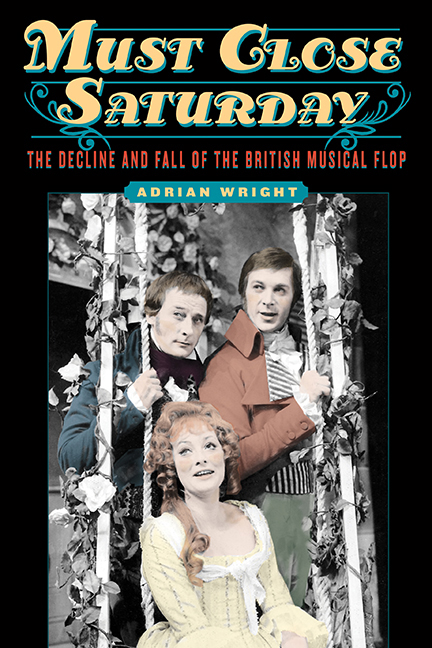Book contents
- Frontmatter
- Contents
- List of Illustrations
- Preface and Acknowledgements
- 1960
- 1961–1964
- 1965–1966
- 1967–1969
- 1970–1972
- 1973–1976
- 1977–1979
- 1980–1983
- 1984–1989
- 1990–1999
- 2000–2005
- 2006–2016
- Appendix: British Musical Flops in London 1960–2016
- Notes to the Text
- Select Bibliography
- Index of Musical Works
- General Index
- Frontmatter
- Contents
- List of Illustrations
- Preface and Acknowledgements
- 1960
- 1961–1964
- 1965–1966
- 1967–1969
- 1970–1972
- 1973–1976
- 1977–1979
- 1980–1983
- 1984–1989
- 1990–1999
- 2000–2005
- 2006–2016
- Appendix: British Musical Flops in London 1960–2016
- Notes to the Text
- Select Bibliography
- Index of Musical Works
- General Index
Summary
‘I would quite happily have volunteered for death myself to help speed things up’
Guardian on Behind the Iron Mask2000: Lautrec Hard Times Napoleon
Henri Toulouse-Lautrec hadn't got much of a welcome when in 1974 he turned up surrounded by ladies de la nuits in Bordello. Back for Lautrec (Shaftesbury Theatre, 6 April 2000; 84), he got much the same response, although at least this time the title warned audiences what they might be in for. Then, the painter had been played by Henry Woolf, now it was Sevan Stephan, with Hannah Waddingham as the prostitute Suzanne singing the best number of the night, ‘Look Into My Eyes’ to Henri's mother, played by the British musical veteran Jill Martin, a survivor from the 1950s through Joie de Vivre (when she sang the ballads ‘Open Your Eyes’ and ‘The Kiss Was Very, Very Small’), Tom Brown's Schooldays, Frank Loesser's Where's Charley?, the revue Cockie! and a record-breaking appearance in all three London productions of My Fair Lady.
Some of the £3.5 million spent on Lautrec was evident in Robert Jones’ brilliant designs for fin-de-siècle Montmartre, but Rob Bettinson's colourful production couldn't altogether mask the cartoonish nature of the script, with material that sounded weak and was sometimes historically inaccurate, with no mention of Lautrec's syphilis. The book by Shaun McKenna (Maddie, La Cava) came in for a deal of criticism, ‘poorly constructed and woefully underwritten’, whether showing how the painter fought with his family, fell in love with a prostitute, drank himself under the table or was thrown into an asylum. All this was ‘dealt with in such thinly written short scenes that the pathos and drama are completely lost’.
Out of curiosity, many went because Charles Aznavour had written the music, with lyrics by his long-time writing partner Dee Shipman, late of Someone Like You. Shipman had already collaborated with Roger Webb on an adaptation of Wolf Mankowitz's A Kid For Two Farthings that never reached the stage.
- Type
- Chapter
- Information
- Must Close SaturdayThe Decline and Fall of the British Musical Flop, pp. 207 - 224Publisher: Boydell & BrewerPrint publication year: 2017

